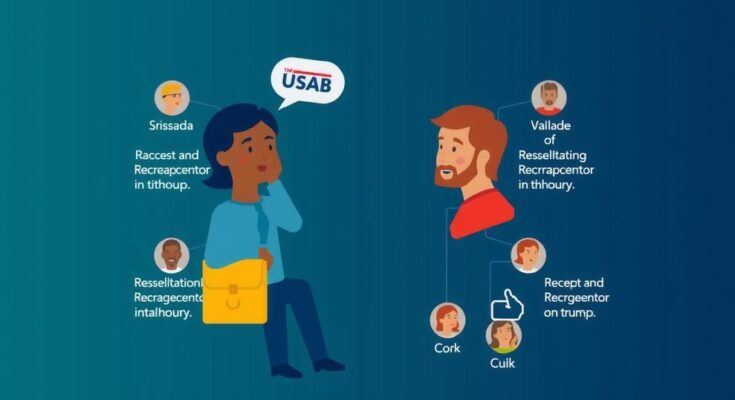With Trump’s potential second term looming, advocates of diversity, equity, and inclusion brace for a calculated assault on DEI initiatives. Through executive actions, judicial appointments, and legislative pushes, the Trump administration could significantly rollback DEI efforts. Organizations can respond by adopting strategies that include compliance, creating safe havens, and advocating publicly for inclusivity, thereby maintaining essential commitments amidst challenging political landscapes.
As the unsettling winds of change swirl through the United States, supporters of diversity, equity, and inclusion (DEI) brace themselves for the potential storm brought by Donald Trump’s possible second term in office. Observers recognize a chilling pattern from his previous tenure that may escalate attacks on DEI, an initiative that seeks to foster fair workplaces. The impending administration is poised to challenge DEI principles through executive orders, legislative actions, and a culturally ingrained backlash that could dampen hopes for inclusivity. In a second term, Trump is expected to launch a systematic dismantling of DEI initiatives. Historical actions, such as the 2020 executive order that attempted to prohibit federal contractors from engaging in DEI training, suggest a penchant for fostering division rather than unity. While the legality of such measures remains questionable, their mere introduction can create a daunting environment for organizations committed to inclusive practices. The Project 2025 roadmap, laden with conservative reforms, hints at even further restrictions, threatening the very fabric of DEI commitments across federal agencies. Moreover, the landscape of the judicial system under Trump could further constrict DEI practices. With the chance to appoint new judges who share a conservative outlook, the judicial reinforcement could limit or even dismantle existing protections. Amidst this climate, organizations have the challenging task of not just preserving their DEI promises but navigating how to adapt and innovate within a constraining framework. To thrive during potentially turbulent times, organizations must adopt strategic approaches akin to navigating in hostile territories. Companies are encouraged to embody the “When in Rome” model where they adhere to legal boundaries while still striving for equitable practices. There are many avenues, such as broadening candidate pools and conducting unbiased hiring processes, that remain legally permissible under restrictive policies. An approach focused on compliance can help maintain essential DEI efforts. The concept of an “Embassy” further encapsulates the role of organizations in cultivating safe spaces for marginalized individuals. By creating a nurturing environment, companies can help prioritize support for at-risk groups under a Trump administration. Implementing healthcare access, promoting employee resource groups, and fostering allyship empower individuals within the workplace and help counterbalance the outside hostility. Finally, organizations must also consider the “Advocate” approach—assuming a role as outspoken champions for DEI rights. By forging public commitments against the rhetoric of anti-DEI activists, companies can reclaim narratives and clarify their stance on inclusivity. History shows that corporate resistance against oppressive policies can galvanize change, making it imperative for organizations to voice their support boldly and unambiguously. In the face of considerable challenges, leaders can engage in a blended strategy that incorporates compliance, advocacy, and enlightenment. The journey towards a just and equitable society remains a pivotal charge for companies, reflecting the shifting demographics that herald diversity’s rising tide. Organizations that rise to meet this challenge, fully embracing their responsibilities, will emerge as stalwarts representing hope for a more inclusive future.
The anticipated implications of a Trump presidency on diversity, equity, and inclusion initiatives prompt concern among advocates for these values. With a record that suggests a preference for dismantling DEI programs, the next administration may adopt policies promoting discrimination under the guise of meritocracy. Examining past strategies, proposed legislation, and the expected reshaping of the judiciary reveals a systemic endeavor to undermine hard-won equity advances across workplaces nationwide. Through a historical lens focused on conservative movements against DEI measures, understanding the landscape of possible future challenges helps define how organizations can respond to a potential rollback of inclusion efforts. With political winds shifting ominously, there exists a pressing need for organizations to reassess and refine their commitment to DEI policies amid an increasingly divisive climate.
In conclusion, proponents of diversity, equity, and inclusion must prepare for a tumultuous era as Trump potentially returns to the White House. By adopting dynamic strategies akin to navigating socially hostile terrains, organizations can continue to advocate for DEI, thus maintaining their ethical commitments. Through compliance without overcompensation, creating sanctuaries, and vocally championing DEI, companies have the potential to preserve inclusivity in their environments. As the nation inches toward becoming more diverse, it is vital for organizations to forge ahead, embracing the complexities of an evolving societal landscape while remaining steadfast stewards of justice and equity for all.
Original Source: hbr.org



